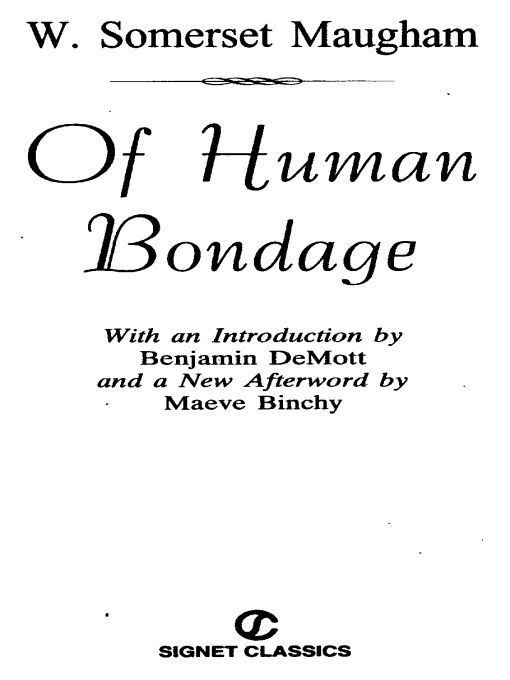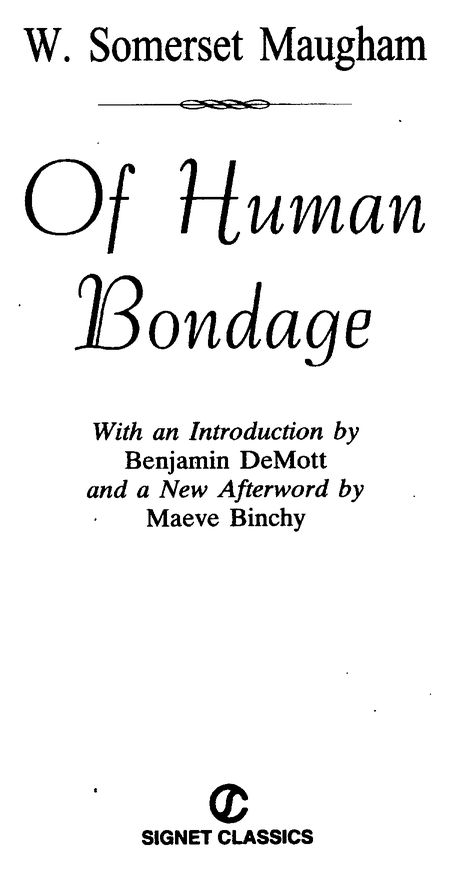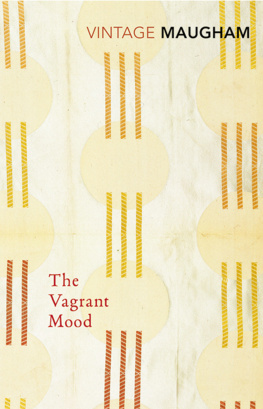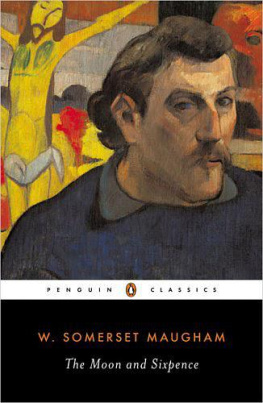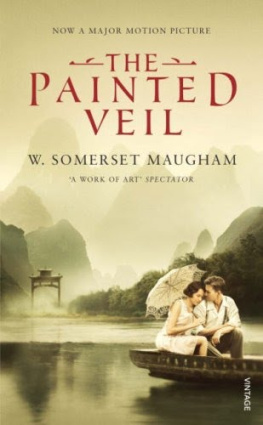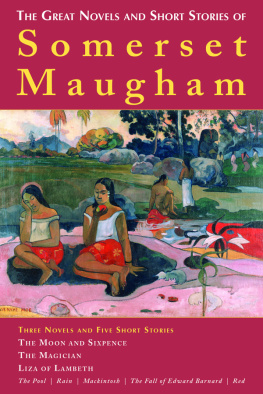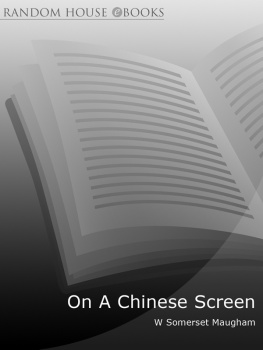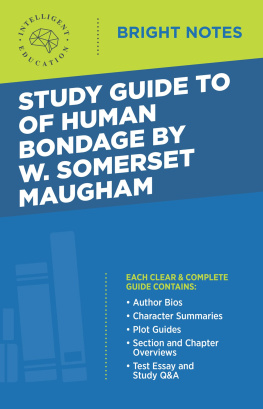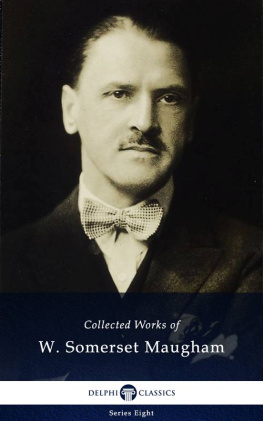Table of Contents
William Somerset Maugham (1874-1965) studied medicine, but the quick success of his first novel, Liza of Lambeth (1897), started him on his lifelong literary career, during which he would become one of the most popular English authors since Dickens. His own life, however, was more tragic, shocking, and fascinating than any novel. After his adored parents died, he grew up in a miserable vicarage and suffered from an embarrassing handicap. During his lifetime, Maugham would marry and divorce, be sent to Russia as a spy, and entertain such celebrities as Jean Cocteau, Winston Churchill, Noel Coward, the Aga Khan, and Ian Fleming at his Riviera mansion. Among his masterpieces are Of Human Bondage, The Painted Veil, The Razors Edge, and The Moon and Sixpence. In addition, such works as The Letter and Rain established Maugham as a gifted short story writer.
Maeve Binchy is the author of Quentins, Scarlet Feather, Tara Road (an Oprahs Book Club Selection), Circle of Friends, Light a Penny Candle, and many other bestselling novels. She lives in Dalkey, Ireland, and London with her husband, writer Gordon Snell.
INTRODUCTION
Of Human Bondage is a novel about growing up, shrewdly observant of stages and processes of growth, unobtrusively penetrating about right relations between self and others. The body of knowledge that the book marshals, non-theoretical and transmitted without pomp, seems in part perfectly familiar. Philip Carey isnt unique in lusting for experiences, or in breaking with his elders faith (and perceiving the break as momentous), or in suffering frustration at the elusiveness of meaning. But even where the materials of Careys story are indistinguishable from those of standard initiation/apprenticeship tales, the tone and treatment are subtly different. And the books later sections, for example the account of Careys work as a hospital obstetric clerk, engage themes of fraternity that seldom figure centrally in the conventional novel of education (the Bildungsroman).
The circumstances of the books composition help to explain its special place among autobiographical novels. In generalno rules without exceptionsautobiographical novels produced by authors at an early age have the strength of intensity and the weakness of self-absorption, while those produced in mid-life lose passion and gain objectivity. Writers in their forties either remember defectively the content of youthful solemnities and aspirations, or they remember well but with embarrassment, and attempt to restrain yesterdays springy navet in corsets of irony. Some measure of the distinction of Maughams autobiographical novel can be attributed to its having been composed in youth and reworked in early middle age.
The author finished the first version of the book (titled The Artistic Temperament of Stephen Carey) at age twenty-three; when publishers rejected it he laid it aside for fifteen years. Throughout much of that period he struggledand often failedas a novelist and short story writer. But in his middle thirties he enjoyed a sudden success as a playwright in London and on Broadway, and the attendant publicity (cleverly exploited) transformed W. Somerset Maugham into an icon of cosmopolitan sophistication.
The mind that returned after a decade and a half to the first draft of The Artistic Temperament wasnt, in short, merely removed from juvenilities; it had endured seasoning by adversity and gone on to win kudos for elegant worldliness. It felt no need to pace off, publicly, the distance between itself and callowness, no obligation to mock a young heros jejune self-preoccupation in order to parry charges of egomania. Further good fortune, it was free of the burden of inventing (or laboring to recall) half-forgotten volatility, fervor, or despair. Thanks to the effort of a literary apprenticethe author himself, barely into his twentiesthe essential raw stuff already existed in words. And the words in question had been set down at a time when the young writer was totally convinced that all the pertinent feelings, states of mind, and revolutions of belief mattered deeply on their own terms.
On their own terms. It bears strong emphasis that Maughams novel registers shaping events and emotions in language commensurate with the electric portentousness those events possess in childhood and youth. The books unashamed fullness of feeling is evident almost from the start, when the hero as a griefstruck nine-year-old visits his mothers bedroom after her death: Philip opened a large cupboard filled with dresses and, stepping in, took as many of them as he could in his arms and buried his face in them. And the same intense demonstrativeness is no less evident 500 pages later when, no longer a child, and depressed by his seemingly hopeless prospects, Philip is moved to tears by a Greek bas-relief in the British Museuman Athenian tombstone that speaks to him of the history of human friendship:
There was one stone which was very beautiful, a bas-relief of two young men holding each others hand; and the reticence of line, the simplicity, made one like to think that the author here had been touched with a genuine emotion. It was an exquisite memorial ... to a friendship; and as Philip looked at it, he felt the tears come to his eyes. He thought of Hayward and his eager admiration for him when first they met, and how disillusion had come and then indifference, till nothing held them together but habit and old memories. It was one of the queer things of life that you saw a person every day for months and were so intimate with him that you could not imagine existence without him; then separation came and everything went on in the same way, and the companion who had seemed essential proved unnecessary. Your life proceeded and you did not even miss him.
The novelist understandshere as elsewhere in the bookthat feeling can be tinged with self-pity and still not deserve contempt. He also understands that, in a writer, terror of the dj vu is proof neither of talent nor genius. When Of Human Bondage (the ur-version) was begun, in 1899, the shedding of religious faith had become a near-clich, but, happily, Maugham wasnt intimidated. He renders the event with a delicate particularity that makes it newreveals it, moment by moment, as a complex, ceaselessly evolving configuration of emotion and reflection.
Philip Careys first daring utteranceI dont see why one should believe in God at alltakes his own breath away like a plunge into cold water. Hes startled, puzzled at himself; he feels fear (a mistake might lead to eternal damnation), and hungers for solitude in which to think matters out. The time frame expands and the reader enters the strange and lonely days and weeks that follow for the hero, grasping how the very risks of unbelief nourish him (he was upheld by the excitement; it seemed to make life a more thrilling adventure). Out on the frontier called atheism, Carey experiences wild exhilaration, and a transformation of nature into a tremendous spaciousness. Scorn breathes in him at the timidity of the weakly faithful among his friends; he feels the onset of pride in his intelligence and fearlessness; at length he commits himself highmindedly to practice Christian virtues for their own sake:
There was small occasion for heroism in the Frau Professors house, but he was a little more exactly truthful than he had been, and he forced himself to be more than commonly attentive to the dull, elderly ladies who sometimes engaged him in conversation.

